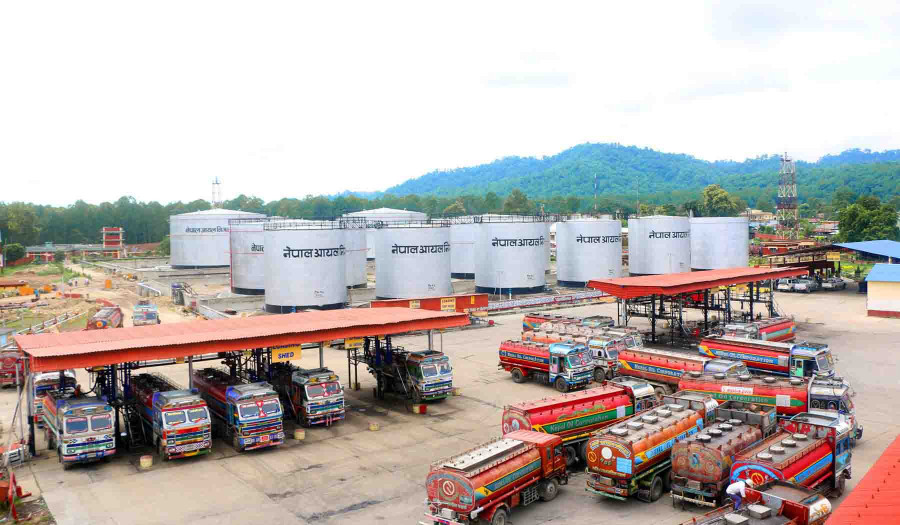Money
Nepal Oil not to cut prices despite profits
The state-owned oil monopoly is making a fortnightly profit of about Rs1.6 billion, officials say.
Krishana Prasain
Nepal Oil Corporation says business has been terrific and profits have swollen after a year, but they can't share the happiness with the Nepali people by giving them a price break.
Manoj Kumar Thakur, deputy director of the state-owned oil monopoly, says they are making a fortnightly profit of about Rs1.60 billion. But they also have debts this high that need to be taken care of first.
“We currently can’t cut fuel prices as we have many pending liabilities. But it’s up to the board of directors whether to cut prices or not,” he said.
The government corporation disclosed that it suffered a loss of Rs49 billion in the last fiscal year ended mid-July 2022.
Thakur says the corporation has liabilities amounting to Rs33 billion. It has drawn Rs23 billion from the price stabilisation fund, a reserve set up to absorb price shocks, which is also payable.
Moreover, the corporation owes Rs6.30 billion to the government. It has used Rs1.55 billion in collateral money from airlines and oil retailers to import fuel when the going was tough.
The corporation has also used Rs3 billion from the serve set aside as employees' residential fund. “We have to repay all the money that we used to import oil.”
It's sole supplier Indian Oil Corporation reviews export prices of petrol and diesel/kerosene every fortnight and of other products such aviation fuel and liquefied petroleum gas (LPG) on a monthly basis.
As per the latest tariff, the corporation makes a profit of Rs12 on every litre of petrol Rs13 on every litre of diesel sold. It pockets Rs37 on every litre of aviation fuel sold to domestic airlines and Rs55 on every litre of fuel sold to international airlines.
The corporation said it was making a profit of Rs7.50 on every cylinder of LPG sold after a long time.
The corporation has projected a gross profit of Rs17 billion in the current fiscal year.
“We will not be able to make a net profit in the current fiscal year because of the monies owed to the government and various organisations,” Thakur said.
The oil monopoly has borrowed Rs7 billion from the government and repays the loan in instalments. "The payback period is five years," Thakur said.
The corporation said they paid the first instalment of Rs700 million to the government in January and the second instalment is due within mid-July.
Consumer rights activists say the oil monopoly has been fuelling inflation.
“The price of crude oil has dropped sharply in the international market. But we are still forced to pay high prices despite the automated pricing mechanism in place,” said Prem Lal Maharjan, president of the National Consumer Forum.
“The government is cheating the public,” he said.
The corporation increases prices in the name of the automatic price mechanism when it is in the red. “But it does not cut prices when it makes a profit,” Maharjan said.
The Black Marketing Act 1975 has capped profits in the most essential commodities.
“But the laws do not apply to Nepal Oil Corporation. The government is not concerned about the consumer either,” Maharjan said.
The company has stopped publishing its profit-loss reports since January which indicates its lack of public accountability, observers say.
According to reports, Brent crude oil has been hovering at around $75 per barrel, down from $110 per barrel a year ago.
Consumer rights activists say that for an import-driven economy like Nepal, fuel prices are major determinants of the market. The high transportation cost means food and non-food prices are higher.
As per Nepal Rastra Bank, the year-on-year consumer price inflation was 7.41 percent in mid-May compared to 7.87 percent a year ago. Food and beverage inflation stood at 5.54 percent while non-food and service inflation rose to 8.89 percent in the review month.
“We have time again written to the government to effectively implement the automatic price mechanism which will justify the pricing system according to the fluctuation in prices. But the government is least bothered to implement it,” said Maharjan.
Consumer forums have written to Industry Minister Ramesh Rijal to implement the automated pricing mechanism.
“We have been assured by the minister that he will accord priority to it,” Maharjan said. “As the corporation has started saying that it will not reduce prices, it seems least bothered to tame rising inflation.”
Nepal imported petroleum products worth Rs383.92 billion in the last fiscal year, the Department of Customs said.




 20.12°C Kathmandu
20.12°C Kathmandu













